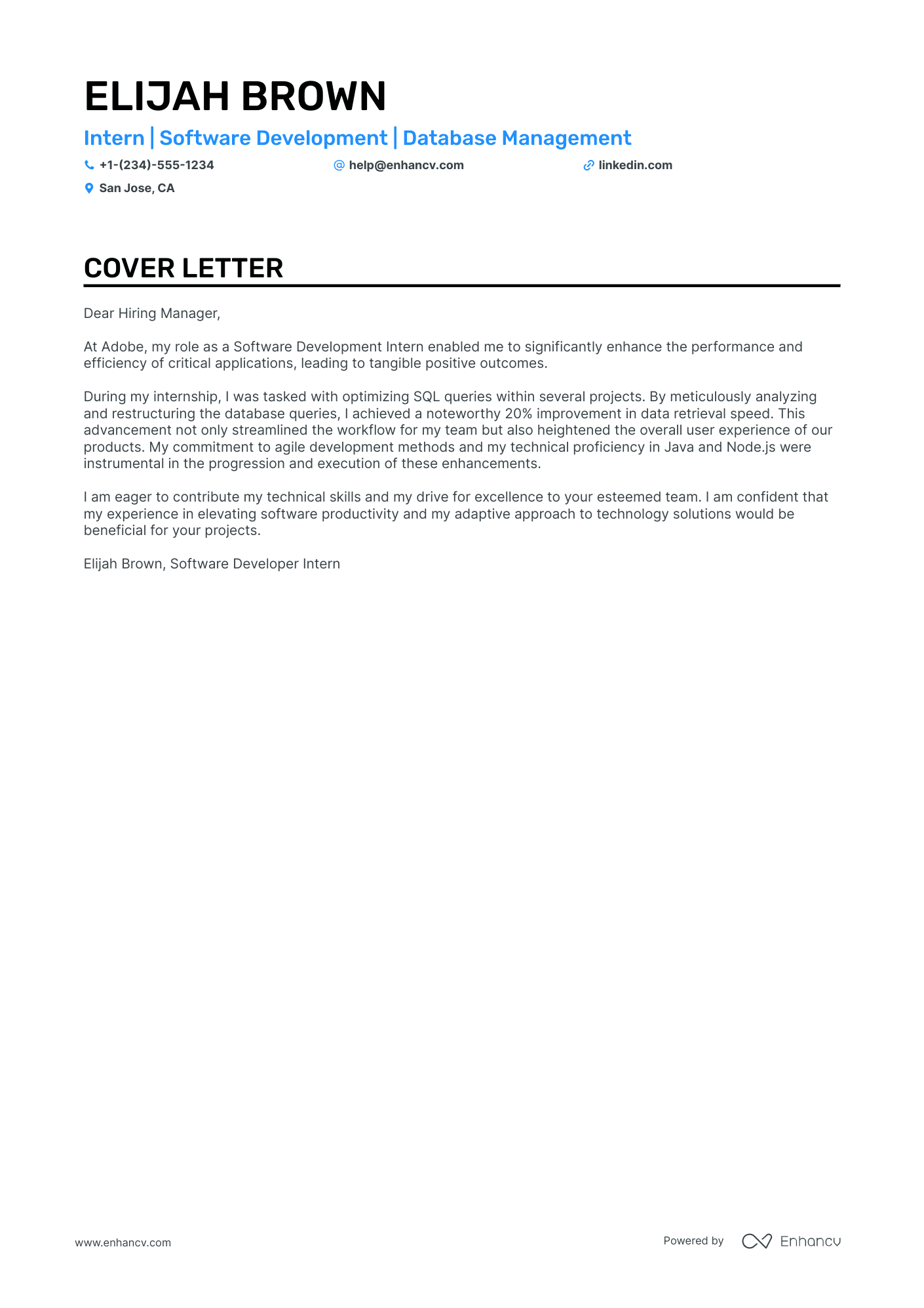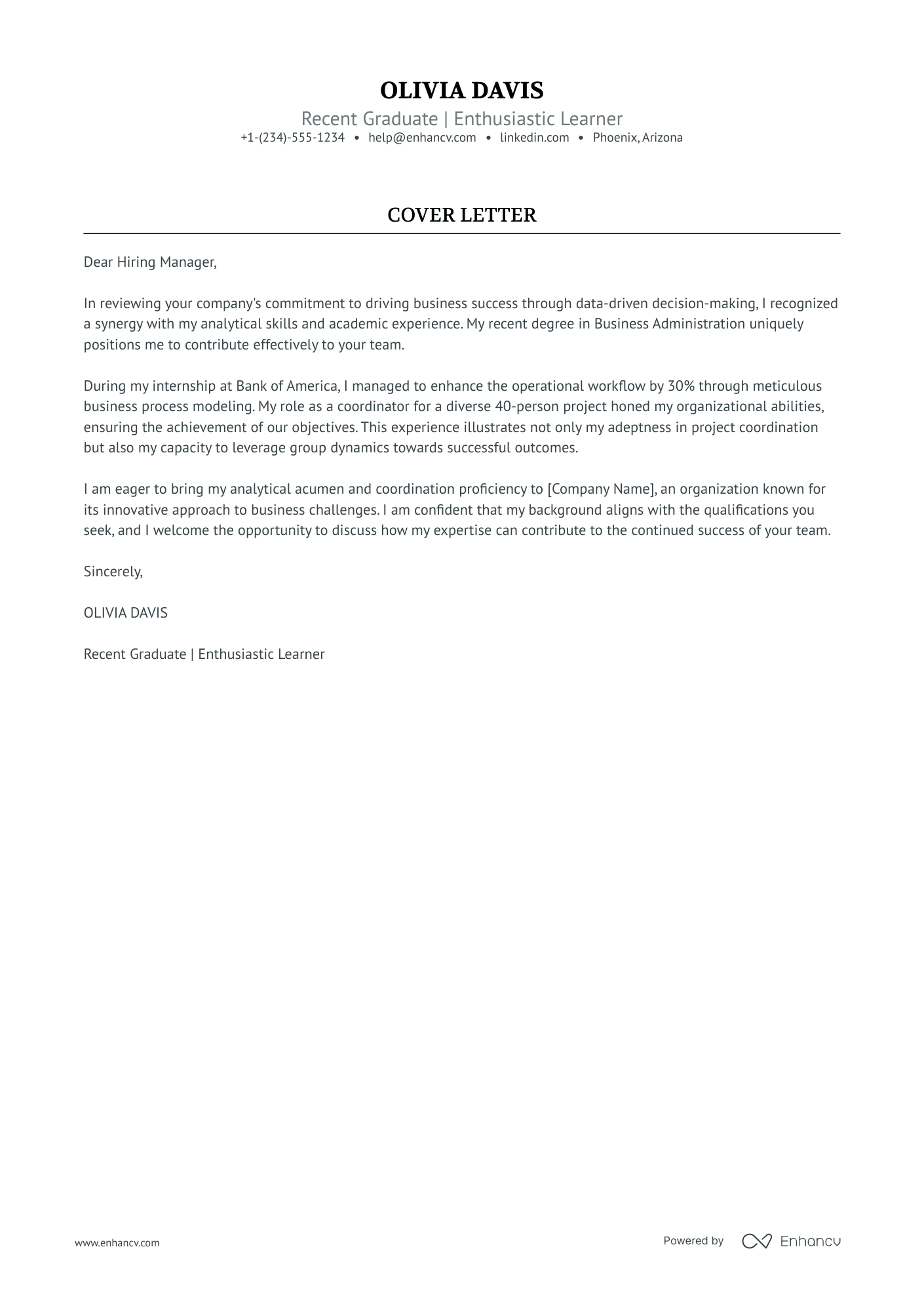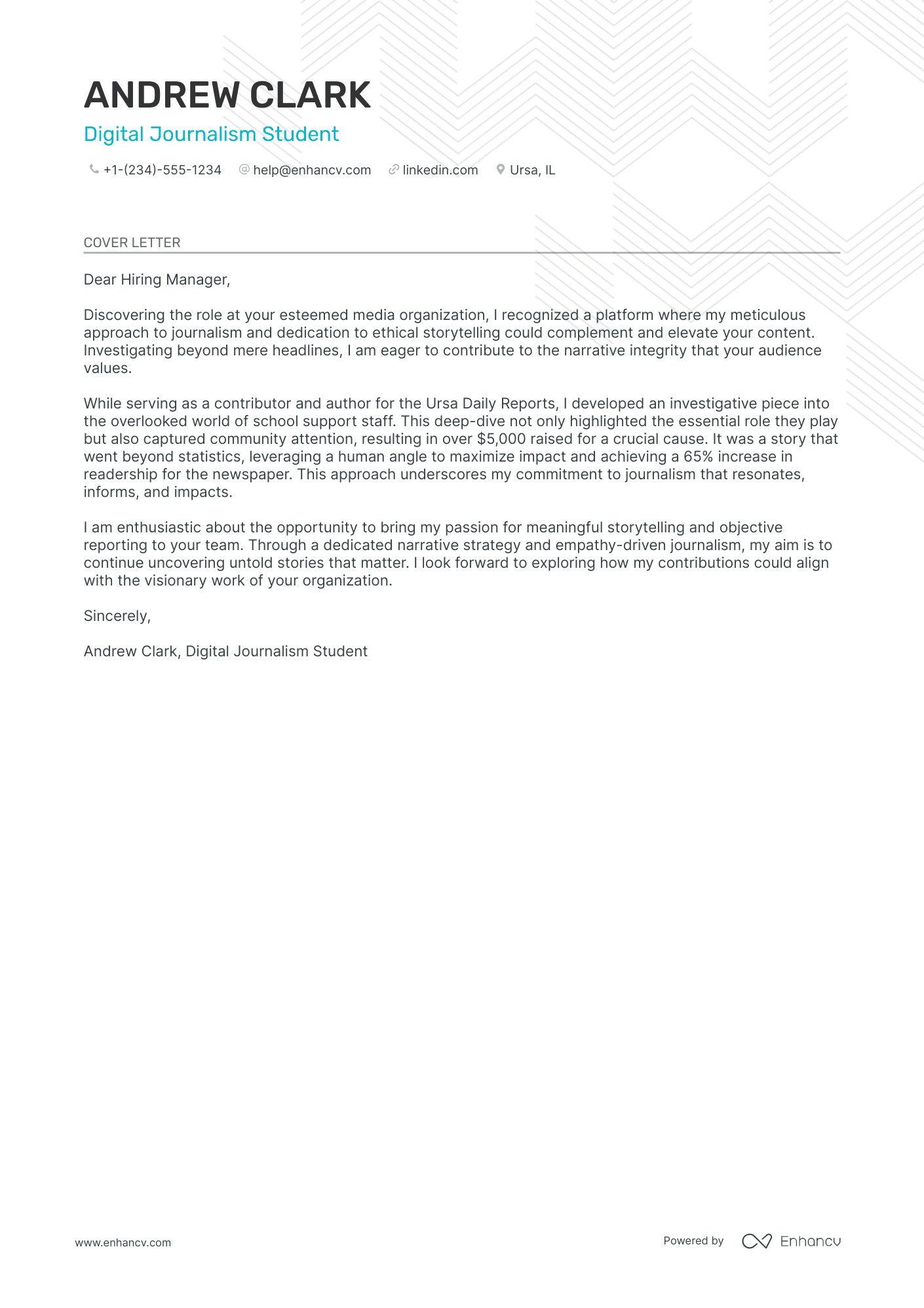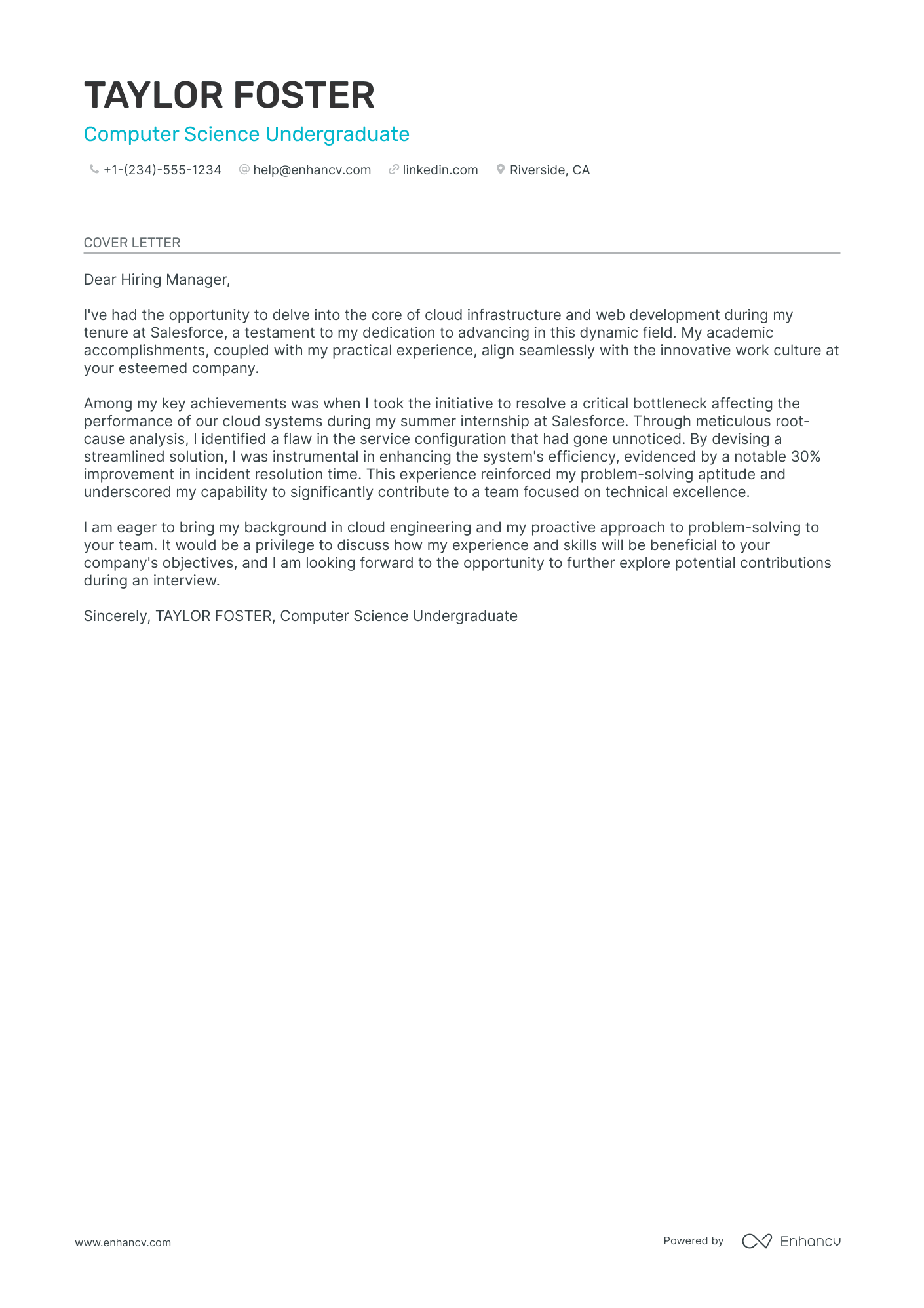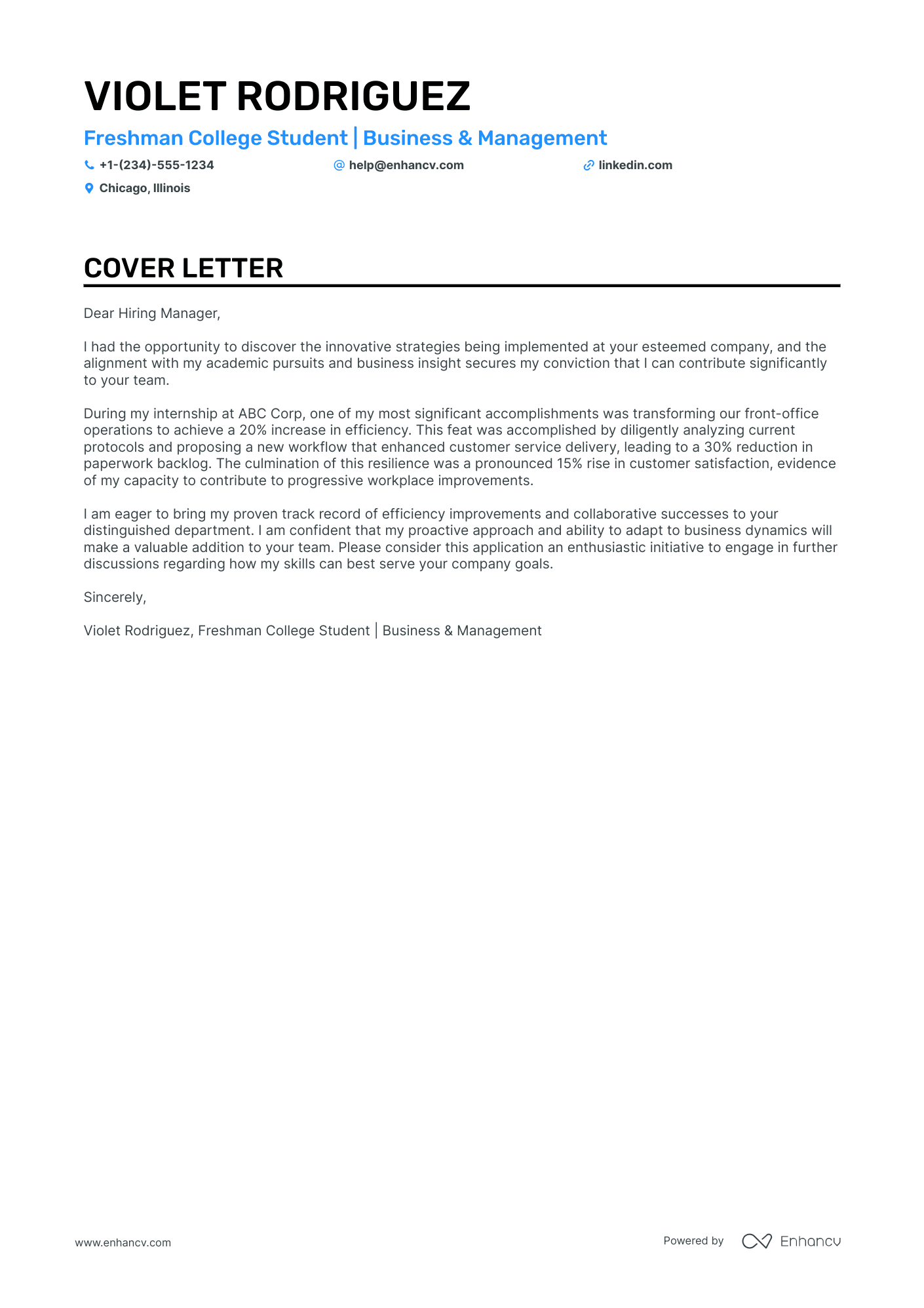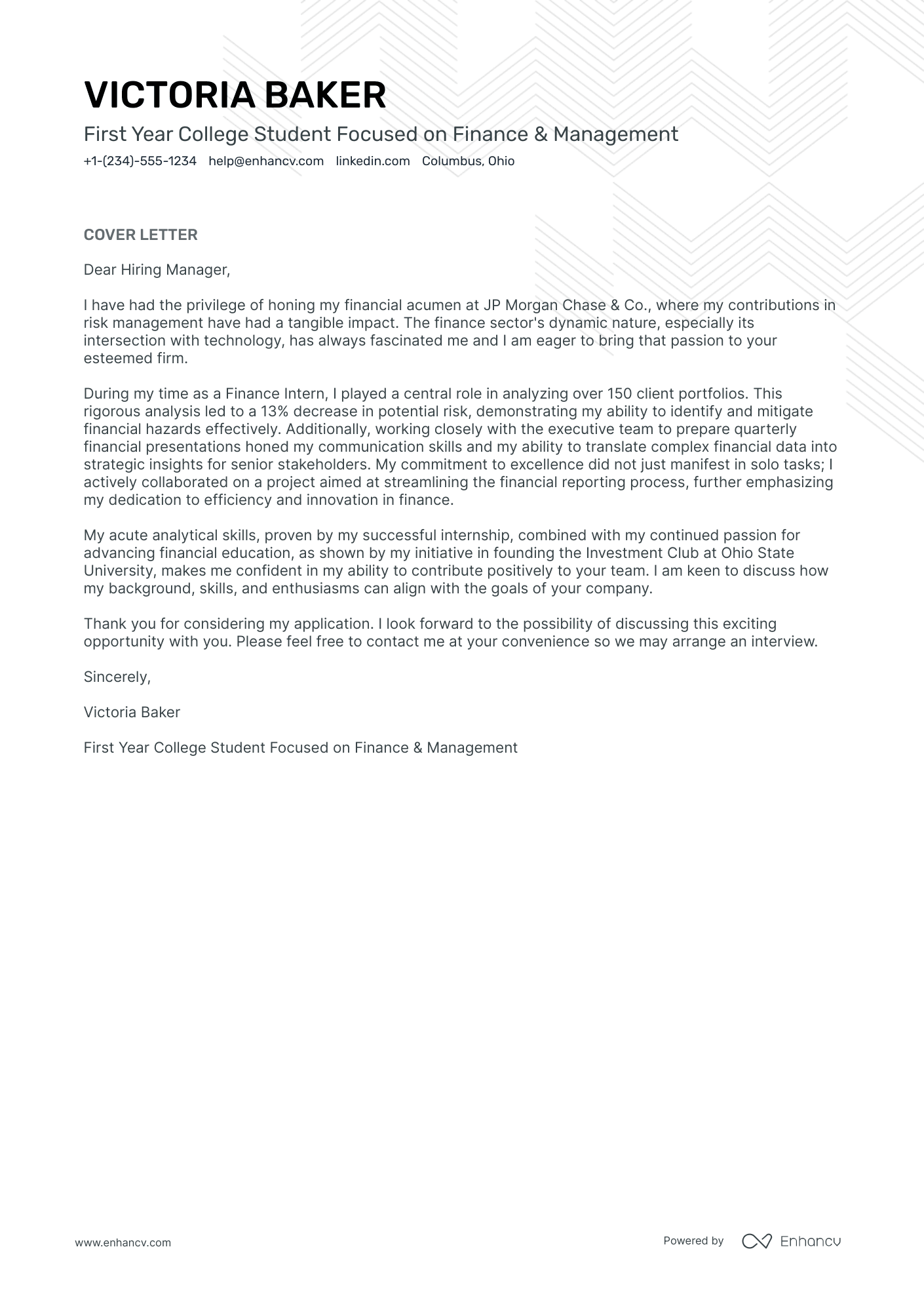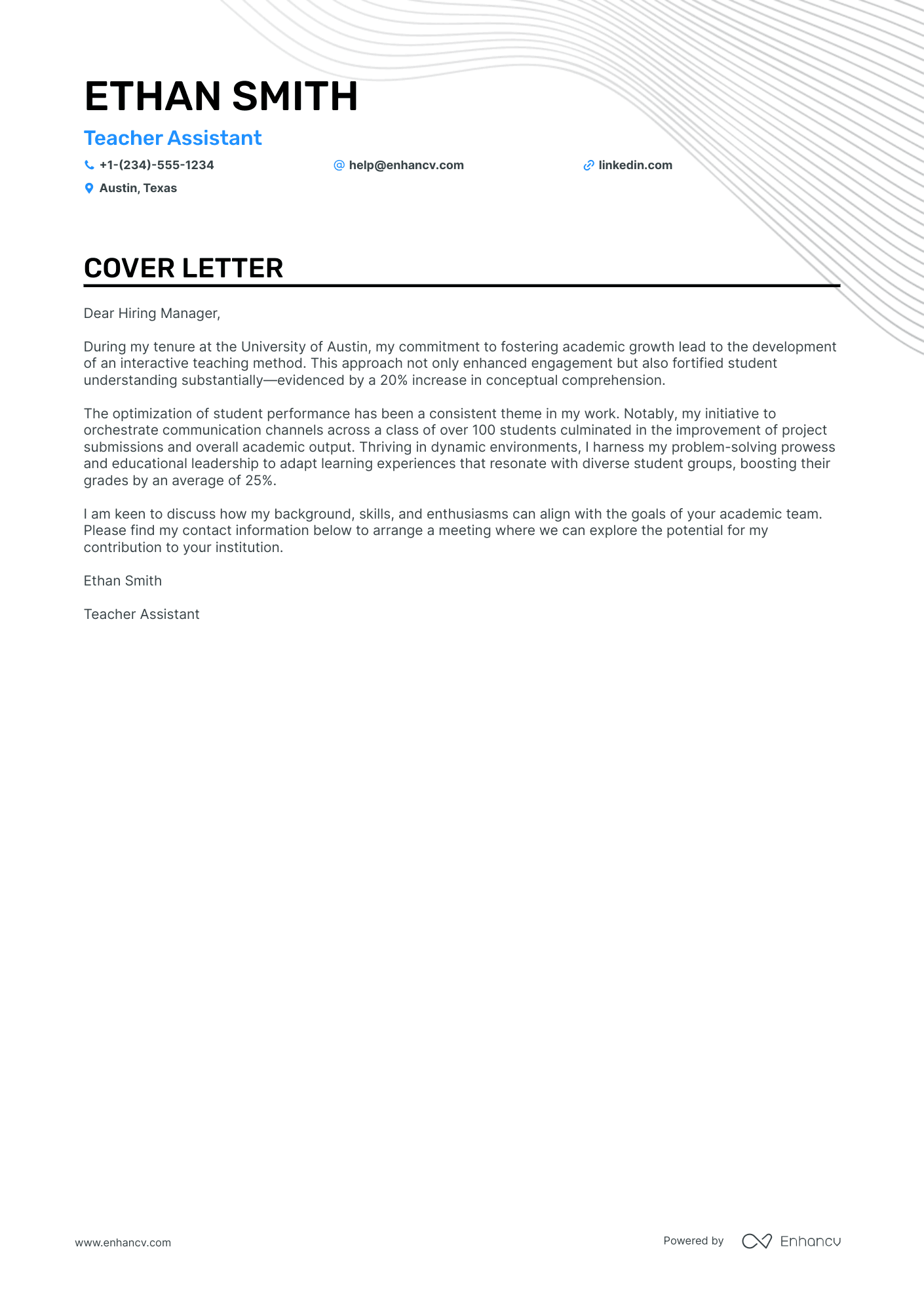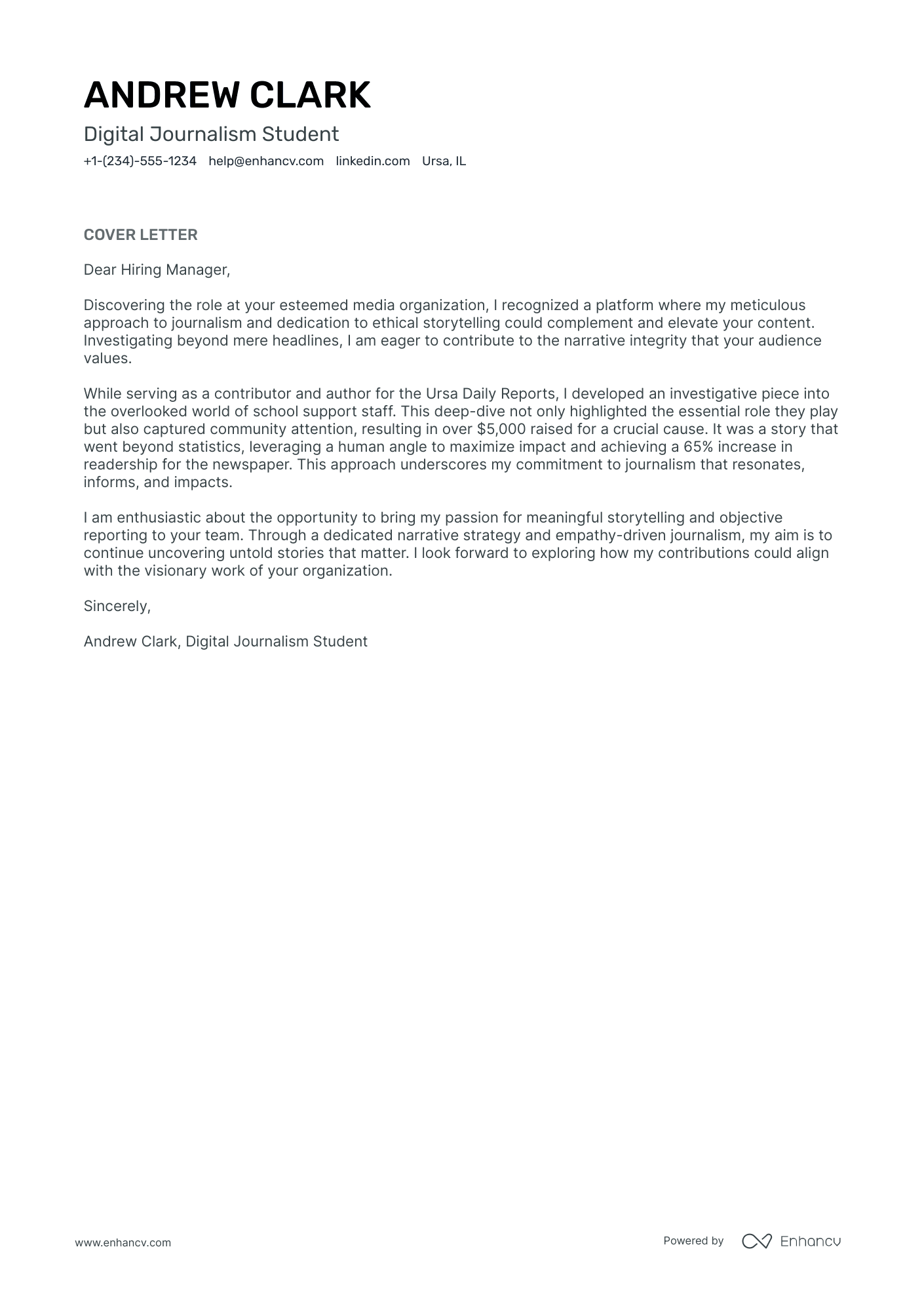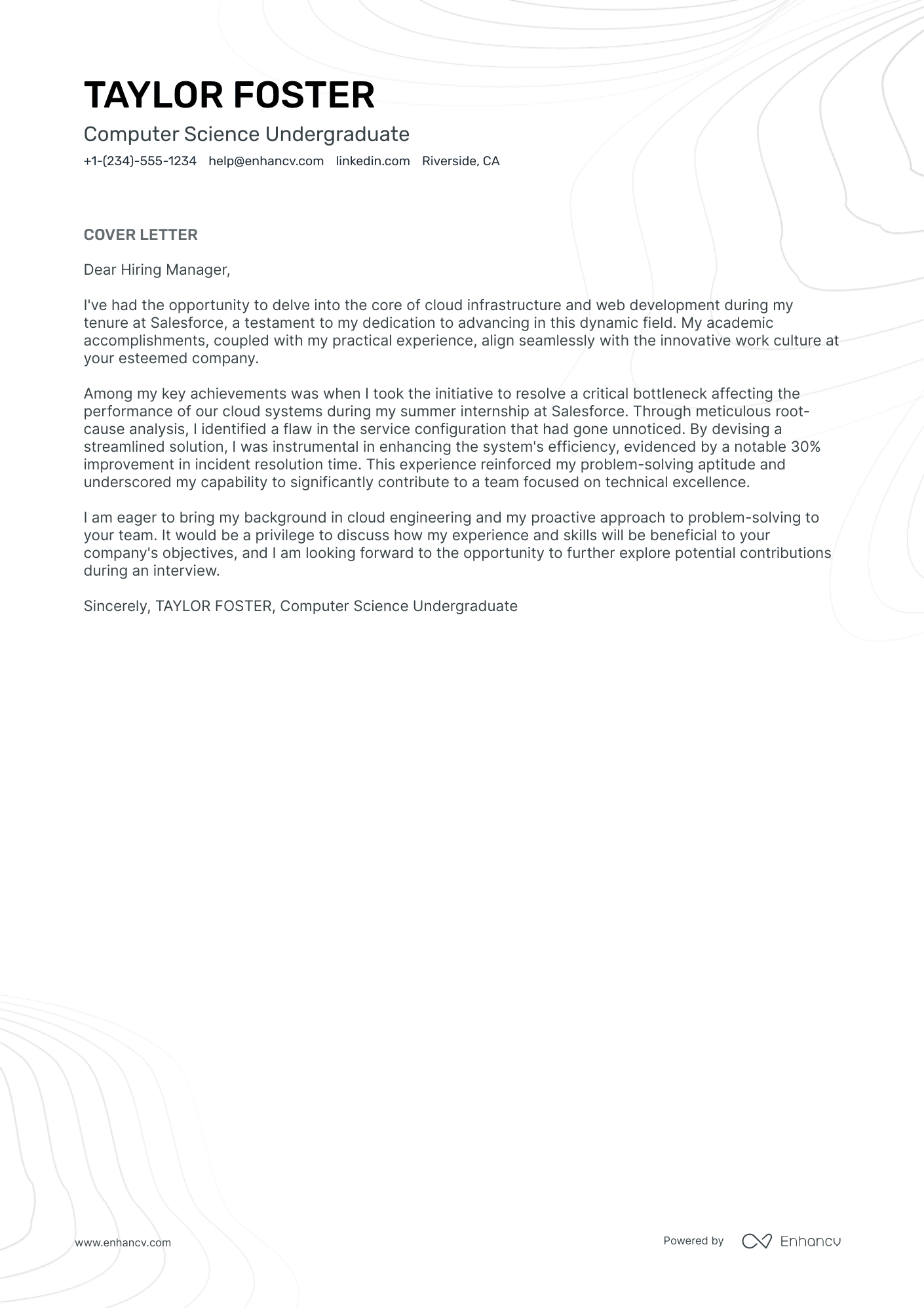As you step into the job market, a well-crafted college cover letter can set you apart, but knowing what to include can be challenging. You've got your resume ready, yet a cover letter demands more—it's your chance to share the triumphs behind the bullet points, like that one achievement that shines brightest in your career constellation. Keep it professional and engaging, dodge the clichés, and remember, brevity is key: your story should unfold in just one page.
- Step your best foot forward in the college cover letter introduction;
- Be inspired by other professionals' certified cover letters;
- Structure your college cover letter to feature what matters most;
- Close off your college cover letter to make a memorable impression on recruiters.
But where to start writing? Upload your resume into Enhancv's AI, which will prepare your college cover letter (all you need to do is personalize it, and you'll be good to go).
If the college isn't exactly the one you're looking for we have a plethora of cover letter examples for jobs like this one:
Drop your resume here or choose a file.
PDF & DOCX only. Max 2MB file size.
College cover letter example
VANESSA FORD
Little Rock, AK
+1-(234)-555-1234
help@enhancv.com
- Demonstrating relevant experience: The cover letter highlights the candidate's past internship at a reputable company (Salesforce) where they gained practical experience with web development, showcasing their ability to contribute to tech-focused projects.
- Quantifying achievements: The applicant mentions specific achievements such as a high success rate and resolving a significant number of complex tickets, which helps in quantifying their capabilities and showing potential impact to the hiring manager.
- Aligning with company values: By expressing admiration for the company's innovative work and commitment to excellence, the candidate shows that their values align with the company culture, which is crucial in a collaborative work environment.
- Call to action: The cover letter closes with an invitation to contact the applicant for an interview, providing a clear next step for the hiring manager to take if they are interested in the candidate's profile.
What should your college cover letter look like - formatting and organizing your information
Have you ever wondered what are the must-have sections you need to include in your college cover letter? Our builder sets those up for you with:
- Header - dedicated to your contact information, the role you're applying for, and the date (don't forget to include your name);
- Greeting and opening paragraph - to create a personalized and memorable experience for recruiters;
- Body paragraph - emphasizing your skill set and knowledge that aligns with the role and helps you to stand out;
- Closing paragraph - leaving a great impression and ending with an optional signature.
Use a cover letter template to discover the best formatting for your college cover letter: that is single-spaced paragraphs and wrapping your content in a one-inch margin.
Ensure that both your resume and college cover letter are in the same font. Stand apart from the crowd by using modern, yet simple fonts, like Chivo and Rubik, instead of the overused Arial and Times New Roman.
Did you know that the Applicant Tracker System (or ATS) won't be assessing your college cover letter? Instead, submit your profile in PDF to recruiters to keep the same formatting and the design intact.
Need a cover letter, but short on time? Use our free cover letter generator to create one from your resume in no time.
The top sections on a college cover letter
- Header: This section includes your contact information, the date, and the employer's contact information, which is essential for the recruiter to know who you are and how to reach you.
- Greeting: Utilize a professional salutation that ideally addresses a specific person by name to personalize your cover letter and demonstrate your attention to detail.
- Introduction: Capture the recruiter's interest by stating your purpose for writing and a brief personal pitch that aligns your skills and interests with the role and the college.
- Body: Elaborate on your relevant experiences, achievements, and the specific qualities that make you a strong candidate for the position, providing concrete examples that demonstrate your suitability and enthusiasm.
- Closing: Conclude with a call to action, expressing your desire for an interview, and a polite sign-off, ensuring you thank the recruiter for considering your application.
Key qualities recruiters search for in a candidate’s cover letter
As a college cover letter is not specific to a particular job title, but rather a general application document often used by students when applying for various roles within a college setting, here are six key qualities, experiences, and traits that recruiters generally prioritize which can be tailored to suit the specific role being applied for:
- Academic excellence and intellectual curiosity: Demonstrates the candidate's ability to succeed in a rigorous academic environment and their passion for learning.
- Leadership experience: Shows the capability to take charge, inspire others, and make impactful decisions.
- Involvement in extracurricular activities: Reflects well-roundedness and the ability to balance multiple commitments.
- Communication skills: Essential for collaborating with peers, faculty, and staff effectively.
- Adaptability and problem-solving skills: Indicate that the candidate can handle unexpected challenges and think on their feet.
- Relevant coursework or projects: Provides evidence of the candidate's interest and background knowledge in the field related to the role.
How to greet recruiters in your college cover letter salutation
As the saying goes, "You never get a second chance to make a first impression."
Write your college cover letter salutation to be more personalized to the actual hiring manager, who is set to assess your profile by:
- greeting them on a first-name basis, if you have previously communicated with them (e.g. "Dear Sam,");
- using their last name, if you have more formal communication or haven't spoken to them (e.g. "Dear Mr. Harrows" or "Dear Ms. Marshall");
- writing "Dear HR Team" or "Dear Hiring Manager", if you have no clue about who's recruiting for the role.
Search on LinkedIn, Google, or the company website to find information as to the recruiter's name.
In any case, avoid the impersonal "Dear Sir or Madam".
List of salutations you can use
- Dear Hiring Committee,
- Dear [Department] Selection Committee,
- Dear [Professor's Name or Title],
- Dear [Dean or Director's Name],
- Dear [Mr./Ms./Dr.] [Last Name],
- Dear Search Committee,
First introductions in your college cover letter
Within your college cover letter introduction, genuinely state what you like about the organization.
Research the latest company projects, honorary awards, company updates, etc.
Write up to two sentences to let recruiters know what impresses you about the company,
This would help you to set a good tone for the rest of the communication.
The middle or body of your college cover letter body: a great instrument to tell a story
Now that you've set the right tone with the greeting and introduction of your college cover letter, it's time to get down to business.
Hear us out, the body of your college cover letter is the best storytelling instrument you have, in your job-hunting arsenal.
Writing the next three to six paragraphs, take the time to reassess the advert to discover job-crucial requirements.
Next, choose one accomplishment that covers those key skills and talents.
Use precisely that achievement to tell an exciting story of how you match the ideal candidate profile.
In the undertones of your story or college cover letter body, hint at the difference you'd make and sell your application as the perfect one for the job.
Final words: writing your college cover letter closing paragraph
The final paragraph of your college cover letter allows you that one final chance to make a great first impression.
Instead of going straight to the "sincerely yours" ending, you can back up your skills with a promise of:
- how you see yourself growing into the role;
- the unique skills you'd bring to the organization.
Whatever you choose, always be specific (and remember to uphold your promise, once you land the role).
If this option doesn't seem that appealing to you, close off your college cover letter with a follow-up request.
You could even provide your availability for interviews so that the recruiters would be able to easily arrange your first meeting.
The zero experience college cover letter: shifting the focus to your unique value
Don't worry if you have no conventional professional experience. Within your whole experience, there's plenty more you can write about in your college cover letter.
Take, for example, your biggest achievement or award - dedicate your cover letter body to describe it and the job-relevant skills you've learned.
Your professional ambitions could also take center stage. Describe what you plan on achieving in the next five to ten years and the efforts you're making towards your dreams.
Key takeaways
Winning recruiters over shouldn't be difficult if you use your college cover letter to tell a story that:
- Is personalized by greeting your readers and focusing on key job skills greets;
- Isn't spread all over the place, but instead focuses on one key achievement and selling your value as a professional;
- Introduces your enthusiasm for the role, passion for the job, or creativity in communication;
- Is also visually appealing - meeting the best HR practices;
- Ends with a nod to the future and how you envision your growth, as part of the company.
College cover letter examples
By Experience
College Student For Internship
College Student No Experience
By Role
